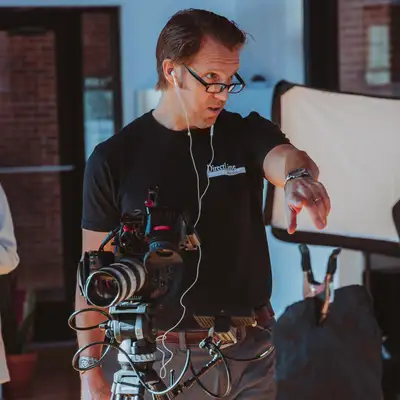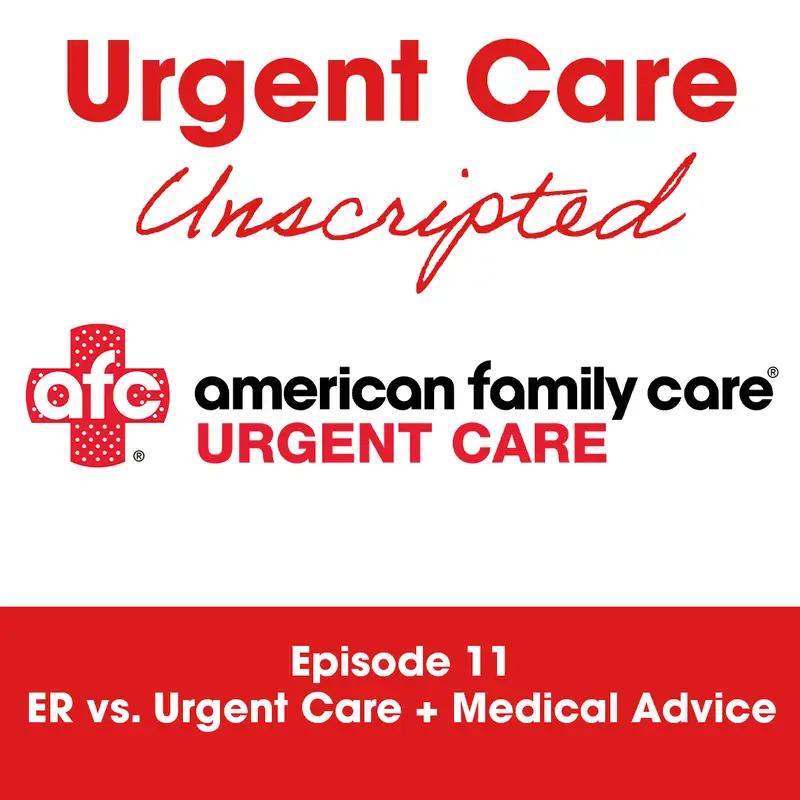Urgent Care Unscripted: Ep. 11 - ER vs. Urgent Care + Medical Advice
Welcome back to Urgent Care Unscripted.
My name is Barbara Reynolds.
Here I am the director of operations and
business development for AFC Urgent Care.
And this is Mohammad Salman and the
franchise here on earth devastated. And
today we
want to talk about, urgent care versus
emergency room.
More precisely, when you have some kind
of an illness and you're trying to decide
where to go, should I go to an urgent care
or, emergency room?
We want to talk about that.
And what are the most common scenarios
that,
we face when you're making
when you're trying to make that decision?
Yeah.
Today we're joined by Doctor
Felix Pacheco.
He is our medical director
and also a veteran E.R.
physician. So welcome, doctor Pacheco.
Hello. Thank you for having me.
I would like to add,
you know, a lot of, patient complaints.
I've seen emergency departments
that can adequately be handled.
And as you can see them, you know,
think about your your pulse,
your springs, if you ever walk on it
and you would be fine.
You could probably see an urgent care.
Got it.
And so these are some of the scenarios
that you just mentioned, opportunities
that are not complex
enough for people to warrant
an urgent, emergency, visit,
I guess, right?
Yeah.
I mean, sometimes it's hard to tell,
but either way, I'll providers
could make an assessment fairly quickly
and determine whether or not,
you know,
a higher level of care is necessary.
That's great.
I think one point is to think about,
is this a straightforward case?
Is it going to require,
you know, an MRI or a cat scan?
Obviously not every patient knows that.
But it's good to call.
You can always call us and we can at least
guide you one way or another.
Yeah.
So once the patient has actually arrived,
saved
the patient has made the choice
to come to an urgent care.
How do
we how
does the provider make that distinction?
Should they give us the decision
actually, to an urgent.
So this is the, the issue is, evaluation
and how the patient appears, you know,
you know, getting vital signs
makes it even more objective, getting,
you know, a blood pressure or heart rate,
temperature and such, that,
you know, laying eyes on the patient
to see how much they structure it.
That's said,
some things are going to be difficult.
If you're coming in from a trauma that,
you know, maybe hasn't
fully manifested yet,
you know,
maybe you have some internal bleeding
that is, identified,
it may be stable
because you're getting healthy
and you work out, you know,
you may be like that for a while,
and then you manifest later,
by somebody, you know,
getting a history,
determining the severity of the injury.
And, you know, making the best judgment
as to whether or not
that needs to be seen in person,
in an emergency setting
or in the urgent care setting,
and would also is a risk assessment,
right?
So if you have a patient
who is a little bit older,
who has diabetes, heart disease,
those are things that we take into account
before we make the decision of
we're going to treat you here versus
we're going to send you out
to the emergency room 100% completely.
But any assessment requires
a, risk assessment of the patient.
You know, how old you are, how many,
comorbidities, how many,
you know, illnesses they might have.
You know,
that changes the, presentation of illness
and the types of diseases
they may be susceptible to.
So just sounds like it's not like a very
straightforward decision.
For the provider,
they have to go through, diagnosis.
They have to, hear out what the condition
of from the patient and do some tests
and then maybe make that call, like,
okay, yes, we can treat that patient here.
Or, you know, it
is, in a, in a stage or condition
that is advanced diagnosis and so forth.
Yeah.
You know, there's a lot of gray,
and we try to keep this simple, you know,
if you have, like a ten year old,
they got cut,
playing with like,
a little, a little knife or something
and just have a small laceration
to a finger, you know?
And it's very deep. Right?
Then you have a high speed,
you know, car accident.
They have rolled over and the piece
into the hands of the patient
will have their seatbelt on,
and they lost consciousness.
You know, those are kind of the examples
where one very easily can be dealt with.
Yeah. And the other not.
One thing that I see too, with,
when it comes to lacerations,
at least from the provider's perspective,
is having, you know, face lacerations.
At the end of the day,
if you want that to be done by a surgeon
or, you know, like a plastic surgeon,
you're going to have a scar.
If you get have done it, we can do it. But
you might have a little
bit of a scar
that is not so nice to look at.
And most cars are not going to have
a plastic surgeon trail
they can repair,
but they may have some other,
surgical specialties
that may make the, wound look nicer.
So that that is true.
I mean, depends on the complexity
of the illness and the concern
the patient may have regarding your custom
pieces.
You know,
you know how much it affected looks.
One thing that I, also wanted to mention
and just mentioned
for the patients here is,
you know, your body better than anybody.
So if you feel like you should go
to the emergency room, do that for sure.
You know, like you and again, we have,
people on site, if you're unsure.
The benefit of urgent care
is, ease of access.
Yeah. Time. And time is a big one.
We tend to be able to see patients
within an hour of their arrival,
potentially even have the patient
discharged within an hour of arrival.
Obviously,
it, though, depends on how busy it is.
But either way,
in an emergency department setting
and then the time of year,
you know, you'd be lucky.
Happy to see you within two hours,
usually, or ten times longer than that.
So time, please, will, make sure you know
how much you pay in your copay.
You know that obviously there are
some motivations from the insurance
perspective regarding change, a patient's
urgent care versus versus primary care.
But either way, there's,
a cost, to that, that
patient depending on the carrier.
But at the end of the day,
like at our urgent care in West Haven.
Yes, in this state
and I would say any urgent care
and, patient's health,
that interest is the top
and only priority, would have to say.
Right. Their health is the priority.
Nothing else really matters
from just a human perspective
and also from a legal perspective.
If you have a condition
that's not within our scope,
we will be in trouble
to try to do anything about it.
And it would be best served for us as well
as for you.
When we refer you to a, emergency room
instead of trying to tackle it
at the urgent care.
So that's not something bad for you
that we could not or failed,
quote unquote, to treat.
You have the urgent care
that we offered you to the emergency room.
That's for your best interests.
And we would do that often
when we see that that's the condition
that needs to be treated.
And it's you need to recover
and it's for your best interest
that you should go to an audience,
you know, so you're welcome to come here.
But then we will also
make the best decision
that suits your needs to this.
Yeah. Definitely.
Health in mind first.
And this is where we have to, adjust.
Maybe the patient's expectations. Yeah.
You know, they,
you know, maybe thought it was minor.
And then we find out
that is something that is a little bit
more than we can handle.
And, you know, we want to make sure
you have the best outcome.
You know what?
You, to be able to walk again,
you know, be able to see us again,
you have to be happy with the care
you receive.
And it would be, a problem for everyone
if, you know,
an emergency was attempted
to be treated in a non-emergency setting.
Yeah.
Okay. Resources.
Absolutely.
And coming from somebody that has worked
with hundreds of providers
in an urgent care setting,
I can definitely say that
if we're sending you
to the emergency room, it's
because that provider really
can or already did the best
that they could for you in that situation.
It's not because they don't
want to treat you.
It's not because they don't want to,
you know,
do whatever it is that you need to do.
It's it's really for the best.
So just just trust
the process is what I'll say.
Yeah.
It's always kind of interesting
because, you know,
it can be a fairly straightforward
evaluation on a patient, you know,
that depending on the patient
expectation, and,
you know, it's taken easily or not.
So, yeah, that's a role to take, you know.
Yeah, absolutely.
And, you know, providers are humans.
So at the end of the day,
some may have more capabilities
and others do comfortability.
I think it's a big thing too
within the provider network system.
So just keep that in mind as well.
I yeah. You touch on the point.
The provider some are greater.
Risk takers.
I'm not concerned, but I'm willing
to take on more responsibility,
you know, you know,
and everybody's a little bit different.
So each provider, you know,
may make a different assessment
with the same patient
depending on how much each
wants to be able to have that condition.
Yeah. You guys are not robots.
So And actually, one thing
I forgot to mention, the severity
of the pain, also plays a role, right?
So one can argue that kidney stones are a,
a life
threatening condition most of the time,
but the severity of the pain is difficult
to manage in your care setting.
So, you know,
if you have, like, severe pain,
that can be great in your care
setting as well.
Yeah, absolutely.
Trust your instincts
and don't hesitate to call.
Don't hesitate to call your local urgent
care us and say this is what I'm feeling.
Should I come here?
Should I go to the emergency room?
We'll do the best to kind of guide
you ahead of time and again.
We might say, come and see us.
We'll try to assess you.
And if it's something that we can't do,
we will send you to the emergency room
as needed.
Thank you so much, Felix,
for joining us today.
That was some really insightful
information.
I think our patients
will definitely appreciate it.
Thank you. See you next time.
Stay informed and stay safe
and subscribe to us and gifted.
We look forward to seeing you again
for the next episode. Yep.
And keep in mind we are located at 354
Sawmill Road in West Haven.
Come see us anytime
you need us. Thank you. Bye.
Creators and Guests




